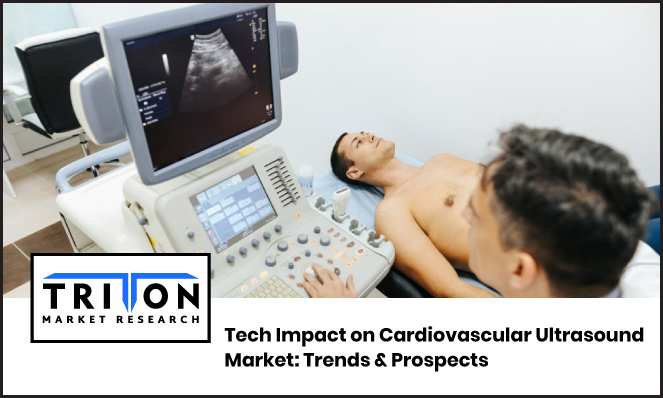



01, September 2022

Cardiovascular diseases (CVDs) have now surpassed cancer as the leading cause of death worldwide, with nearly 17.9 million lives lost every year. They are a group of illnesses, such as coronary heart disease, rheumatic heart disease, cerebrovascular disease, and others, affecting the heart and blood vessels.
Early detection is crucial to prevent these fatalities and seek timely care. Also called cardiac ultrasound or echocardiography, cardiovascular ultrasound is an imaging system that performs a detailed clinical diagnosis of the heart and detects any underlying issues in a relatively shorter duration.
According to Triton Market Research, the global cardiovascular ultrasound market is likely to develop with a CAGR of 6.12% in the forecast period from 2022 to 2028. The rising prevalence of CVDs has enhanced the demand for echocardiography devices, which is expected to drive the global market.
In recent years, the prevalence of hypertension, high blood glucose levels, elevated blood lipid levels, obesity, etc., has increased, which are risk factors for CVDs. Obesity rates have ascended in France, affecting 17% of the population.
Also, the substantial rise in the geriatric population, which is prone to several health conditions due to aging, contributes largely to the increased disease burden. In Brazil, people aged 50-79 are the most affected. With $61.78 million, the country accounted for the largest share in Latin America’s cardiovascular ultrasound market in 2021.
Realizing the importance of timely disease diagnosis, the Government of Australia launched the Cardiovascular Health Mission in 2019, which brings together experts in this field to make transformative improvements for patients’ cardiac health. The Australian market is expected to grow the fastest in the Asia-Pacific, with a 7.89% CAGR.
The cardiovascular imaging domain has evolved due to the developments in 2D, 3D/4D, and Doppler technologies in ultrasound imaging. Another technology is point-of-care ultrasound, which uses a portable system that enables assessing patients without requiring them to be physically present in a cardiology department.
Advancements in technology offer numerous benefits, such as real-time imaging, ionizing-radiation-free imaging, enhanced diagnostic accuracy, improved patient safety, etc., which have revolutionized the field of echocardiography.
Doppler imaging technology can detect heart valve defects, congenital heart disease, blocked or bulging arteries, and other conditions. Doppler ultrasound systems are gaining popularity as they easily identify any problems associated with the blood flow within the heart, which are otherwise difficult to diagnose.
Lanmage’s C6 portable color Doppler ultrasound system, which offers excellent imaging quality, is equipped with powerful functions for use in cardiac, vascular, and other applications.
Fetal echocardiography is a type of ultrasound test performed on pregnant women to examine the fetus’ heart for any structural or functional abnormalities. Its demand is rising due to increased detection rate of congenital anomalies, with congenital heart disease the most common anomaly.
LISENDO 880LE is a premium 3D/4D diagnostic ultrasound system by FUJIFILM Holdings Corporation is a preferred choice by several cardiologists for pediatric and fetal heart patients.
A majority of the key market players are headquartered in Europe (GE Healthcare, Siemens Healthineers, Esaote S.p.A.) and the Asia-Pacific (Dawei Medical, Leltek Inc, Zoncare), signifying the large consumer base in these regions. The industry rivalry is significantly high due to manufacturers launching new products incorporated with innovative features.
The integration of artificial intelligence (AI) technology into numerous cardiac ultrasound systems has emerged as the latest trend. AI in echocardiography is vital for disease diagnosis, standard section recognition, left ventricle functionality assessment, and automatic cardiac cavity segmentation.
Besides, introducing AI in cardiovascular ultrasound imaging has eased the whole process by eliminating the need for unnecessary testing and minimizing the costs incurred.
In the coming years, artificial intelligence’s role in echocardiography would become far more pertinent in developing smart algorithms for identifying risk factors and providing a more precise diagnosis. AI incorporation thus lays the foundation for the future of the cardiovascular ultrasound market.

Prevalent cases of terrorist attacks in today’s world is increasing the need for severe standards of security for public safety, and the global market for biometric technology scrupulously accommoda..
Prevalent cases of terrorist attacks in today’s world is increasing the need for..